
You continue to consult with the eye doctor once a year if you have glasses, right? Because, over time, your eyes can change. As a matter of fact, no part of your body is static, your eyes aren’t and, it turns out, your ears aren’t either. That’s why, just as it is with your eyes, it’s necessary to keep getting your ears examined even after you’ve invested in a nice pair of hearing aids.
Unfortunately, many people miss those regular checkups. It’s easy to overlook going in to consult with your hearing care professional because you’ve been busy enjoying life. Or it could be that your job has been difficult recently. You could even be so happy with your hearing aids that you simply didn’t think you need to go back in. You would normally think of that as a positive thing.
In the long run, for people suffering from hearing loss, it is even more relevant to have even one follow-up appointment. Even in the face of that, regular attention is often neglected. According to one survey, only 33% of seniors with hearing aids also used regular hearing services.
After You Have Hearing Aids, Why Would You Require to Get Regular Examinations?
Your hearing is dynamic. It changes over time. It’s significant to modify the hearing aids to resolve those changes. Routine testing helps monitor any variations in hearing and discover issues early.
And this is not even the only reason why it could be a good idea to maintain routine consultations with a hearing expert once you have your hearing aids. Here are some reasons why you really should make it to your hearing exams:
- Calibrating Hearing Aids: Even though your overall hearing health may remain stable, small changes in your hearing could produce the need for annual adjustments of your hearing aid. Without this calibration, your hearing aids could slowly become less effective.
- Degeneration of hearing: Even if you use a hearing aid, your hearing may keep degenerating. If this degeneration is slow enough, you most likely won’t know it’s happening without the aid of a hearing test. Hearing decline can often be slowed with appropriate alterations to your hearing aids.
As well as tracking changes in your hearing, it’s crucial to occasionally have a professional cleaning. We can help make sure your hearing aid is working the way it is supposed to, clean all the little components and keep it in peak condition.
The Danger of Not Following up With Regular Exams
If you get frustrated with your hearing aids, say because they aren’t working the way you thought they would, you may simply discontinue using them and that would be a problem. Hearing aids make your all-around health better and also, of course, makes your hearing stronger. You may not notice it immediately, but your hearing could decline faster if you stop wearing your hearing aids. Increased concern of hearing accidents, as well as cognitive decline, have been linked to loss of hearing.
If you want your hearing aids to continue working at the most effective level, normal examinations are going to be your best choice with regards to accomplishing that. Annual hearing examinations or screenings can help you make sure your hearing aids are working as they should and that your hearing is safeguarded. So make your hearing consultation now.
